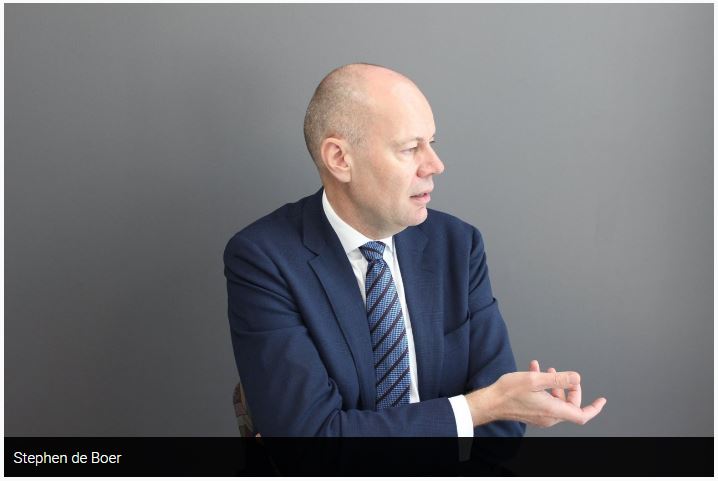As Asean chair, Thailand can help fix WTO, says Canadian trade negotiator
CANADIAN and Thai trade negotiators believe the Kingdom can play a leading role in reforming the World Trade Organisation (WTO) to save it from complete collapse.
However, one local economist disagrees, saying it is beyond the capacity of such a small country to save the WTO from a crisis in its multilateral trading system.
Stephen de Boer, Canada’s ambassador and permanent representative to the WTO, said in an exclusive interview with The Nation that Thailand is the 2019 chair of the 10-country Asean trade bloc and its ambassador has assumed the helm of the WTO General Council.
These positions give the Kingdom substantial leverage in WTO reforms, de Boer said.
Sunanta Kangvalkulkij, Thailand’s ambassador to the WTO, is chairing its General Council – its highest-level decision-making body – in Geneva,
“She can influence the way things roll out this year,” de Boer said.
Thailand is among the 90 countries actively supporting the multilateral trading system and is engaging in the reform negotiations, he said, but the process requires input from all 164 members.
Canada recently created “the Ottawa group” of WTO members in a bid to restore public and governmental trust and confidence in the organisation.
“The multilateral trading system is facing significant challenges,” de Boer said. “A lot of people say it’s because of the [Donald] Trump administration, but that’s probably unfair.” Isolationism under President Trump is just one of many challenges confronting the WTO, he said.
WTO members are also mired in the Doha development agenda, talks for which began in 2001. The agricultural sector, specifically, is posing obstacles, though agreement has been reached on export subsidies, environmental clauses and information technology, while negotiations on fishery subsides should be completed by December. Currently, talks are underway on e-commerce.
“We’ve recently faced a challenge regarding the system of resolving disputes, while the US has blocked the appointment of new members to the WTO appellate body,” de Boer said. “There should be seven members, but they are only three right now, dropping to one by December. You need at least three to form a quorum, so the panel will cease being functional.”
He said Canada shared the US view that changes were necessary to improve the WTO, which was founded in 1995. Members are examining what works well and what doesn’t.
However, he agrees with the US that the dispute-settlement mechanism is too legal – too much like a court of law. But, de Boer said, Canada objects to the US tactics of blocking appointments to the appellate body, as it undermines the world trade body.
Regulations governing the appellate are not always clearly worded and prone to contradictory interpretations, as is common in any legal system, he said.
Dispute settlement
“The fundamental question is: Do you believe in the system overall, and if you believe in the system, are you willing to abide by a decision you don’t agree with [as well as] abide by a decision you do agree with?” he asked.
The US under Trump’s leadership has been taking action unilaterally against China and other countries in trade disputes. This has undermined the multilateral system, which requires members to settle their disputes via the WTO dispute-settlement mechanism.
Trump raised tariff rates against Chinese goods, citing unfair trade practices against US companies as well as China’s continuing high-trade surplus with the US. He has also taken unilateral action against other countries by raising tariffs on imported washing machines, solar panels, steel and aluminium – which is negatively affecting Thailand, EU, Canada, Mexico and other countries. China has retaliated against the US by raising tariffs against US goods.
“We hope the US will return to the WTO,” de Boer added.
In separate interview, Auramon Supthaweethum, director-general at the Department of Trade Negotiations, confirmed to The Nation that Thailand, as Asean chair, will play a greater role in saving the WTO.
The Thai government and WTO held a seminar in Bangkok last week entitled “WTO-Asean Regional Policy Dialogue on WTO Reforms ”. Senior Asean officials will meet in Laos early next month to discuss coordinating collective actions to push for WTO reforms, she said.
“Thailand agrees that it is urgently needed to find solutions to the deadlock in the appellate body before December,” she added.
The economist Sakon Varanyuwatana, however, is sceptical about Thailand’s leadership role at the WTO. “We in Thailand – a small country – cannot do much given that the US, a powerful country, has ignored the multilateral trading system,” he said, adding that many countries have also created trade blocs as an alternative or supplement to the multilateral trading system.
“Thailand should instead focus on negotiating free-trade agreements under RCEP and CPTPP,” Sakon suggested.
Source: http://www.nationmultimedia.com/detail/Economy/30366054


 English
English




